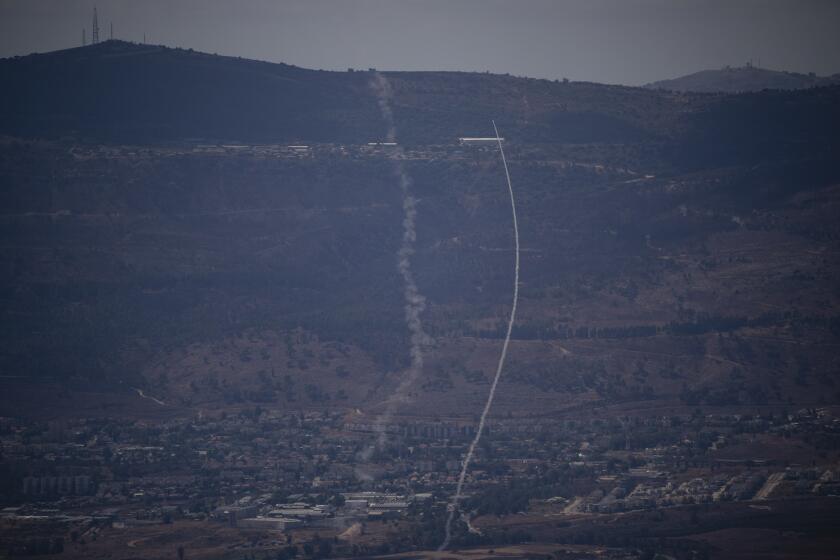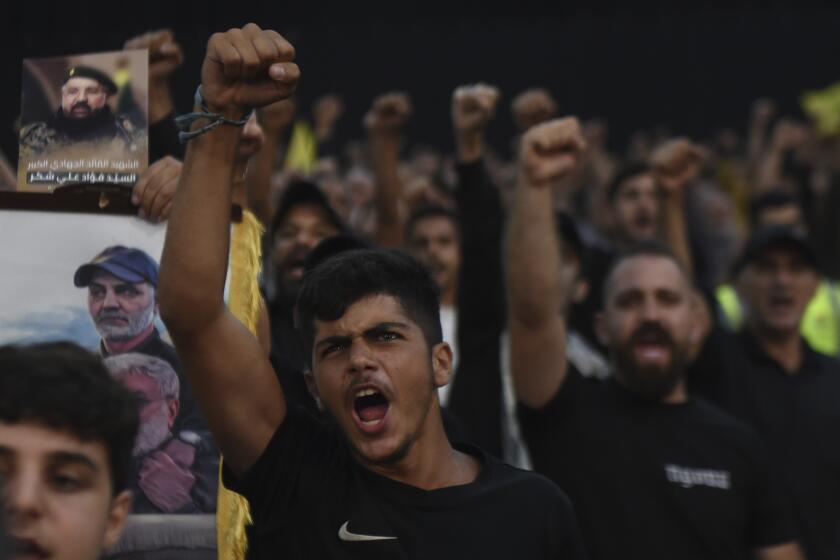Israeli raids against Hezbollah signal a wider ground incursion into Lebanon could come soon

- Share via
BEIRUT — The Israeli military launched small ground raids against Hezbollah and sealed off communities along its northern border on Monday as Israeli artillery pounded southern Lebanon and signals grew that more forces could soon be sent across the border to fight the Iran-backed militants.
State Department spokesman Matthew Miller said Israel informed the U.S. about the raids, which he said were described as “limited operations focused on Hezbollah infrastructure near the border.”
There were no reports of direct clashes between Israeli troops and Hezbollah militants, who last engaged in ground combat on Lebanese soil during a monthlong war in 2006.
But a Western diplomat in Cairo whose country is directly involved in de-escalation efforts said an Israeli ground operation in Lebanon is “imminent.” The official, who spoke on condition of anonymity due to the sensitivity of the situation, said Israel had shared its plans with the U.S. and other Western allies, and conveyed the operation would “be limited.”
The latest attacks raised the death toll from the Israeli strikes over three days to 615, with more than 2,000 people wounded.
Israel and Hezbollah have exchanged fire almost every day since the war in Gaza began, displacing tens of thousands of people in Israel and Lebanon. Israel says it will continue to strike Hezbollah until it is safe for families to return to their homes near the Lebanon border. Hezbollah has promised to keep firing rockets into Israel until there is a cease-fire in Gaza.
It was not clear whether Israel had made a final decision on a broader ground operation in Lebanon. The Israeli army’s radio station said a Cabinet meeting wrapped up late Monday, with Prime Minister Benjamin Netanyahu continuing to consult with security officials.
Hezbollah vowed Monday to keep fighting even after its longtime leader, Hassan Nasrallah, and other top officials were recently wiped out by Israeli strikes.
The group’s acting leader, Naim Kassem, said in a televised statement that if Israel decides to launch a ground offensive, Hezbollah is ready. He said commanders killed in recent weeks have already been replaced.
The man widely expected to take over the top post from Kassem is Hashem Safieddine, a cousin of Nasrallah who oversees Hezbollah’s political affairs.
Israel says that halting Hezbollah’s attacks in the country’s north to allow its residents to return to their homes there is now an official war goal as it considers a wider military operation in Lebanon.
Israel’s order restricting entry and exit from the northern communities of Metula, Misgav Am and Kfar Giladi does not necessarily mean Israeli troops will immediately invade Lebanon. Areas can also be declared closed military zones if an imminent threat is detected.
But the army has heavily beefed up forces along the border in recent days, and commanders have said they are prepared to go into Lebanon if ordered to.
Chris Coyle, a resident of northern Israel, said the army had erected gates and checkpoints throughout the region and positioned scores of tanks along the border in recent days. “They’re certainly getting ready to go in,” he said.
In the nearby Golan Heights, an Associated Press reporter heard Israeli artillery fire and explosions in southern Lebanon. Israeli forces also fired flares into Lebanon.
An AP reporter in the southern Lebanon town of Marjayoun reported sounds of heavy shelling and explosions and occasional airstrikes coming from areas closer to the border.
Israel carried out a new strike in Beirut, which it said killed a senior Hezbollah commander, and the militant group launched dozens of rockets into Israel.
Israeli strikes in recent weeks have hit what the military says are thousands of militant targets across large parts of Lebanon. Over 1,000 people have been killed in Lebanon in the last two weeks, nearly a quarter of them women and children, according to the Health Ministry.
Early Monday, an airstrike hit a residential building in central Beirut, killing three Palestinian militants, as Israel appeared to send a message that no part of Lebanon is out of bounds.
Hezbollah’s capabilities are unclear after a series of major blows
Hezbollah has significantly increased its rocket attacks in the past week to several hundred daily, but most have been intercepted or fallen in open areas. Several people have been wounded in Israel. There have been no fatalities since two soldiers were killed near the border on Sept. 19.
But Hezbollah’s capabilities remain unclear.
As recently as two weeks ago, a strike like Monday’s in central Beirut — outside of the main areas where Hezbollah operates and next to a busy transportation hub normally crowded with buses and taxis — would have been seen as a major escalation and likely followed by a long-range Hezbollah strike into Israel.
Emergency officials say at least 19 people including six soldiers have been wounded in northern Israel after Lebanon’s Hezbollah militants launched drone attacks.
But the unspoken rules of the long-running conflict no longer seem to be in effect.
It’s possible Hezbollah is holding back to save resources for a bigger battle. But the militant group might also be in disarray after Israeli intelligence apparently penetrated its highest levels.
Some European countries began pulling their diplomats and citizens out of Lebanon on Monday. Germany sent a military plane to evacuate diplomats’ relatives and others. Bulgaria sent a government jet to get the first group of its citizens out.
Monday’s strike in Beirut killed three members of the Popular Front for the Liberation of Palestine, a small leftist faction that has not been meaningfully involved in months of fighting between Israel and Hezbollah. Israel has not claimed the strike but is widely assumed to have carried it out.
Also Monday, Hamas announced its top commander in Lebanon, Fatah Sharif, was killed with his family in an airstrike on the Al-Buss refugee camp in the southern port city of Tyre. The Israeli military confirmed it had targeted him.
Israel’s assassination of Hezbollah leader Hassan Nasrallah set off furious grief or grim satisfaction, redoubling fears of a widening regional war.
Hezbollah began firing rockets, drones and missiles into northern Israel after Hamas’ Oct. 7 attack from Gaza into Israel sparked the war in the Palestinian territory.
Israel responded to the rockets with airstrikes in Lebanon, and the fighting has steadily escalated over the past year. The Lebanese government says the fighting may have displaced up to a million people, although the U.N. estimate is around 200,000.
Israel shows little interest in cease-fire calls as it bloodies a longtime foe
The United States and its allies have called for a cease-fire, hoping to avoid further escalation that could draw in Iran and set off a wider war. But Netanyahu has shown little interest, as his country racks up military achievements against a longtime foe.
France, which has close ties to Lebanon, joined the United States in calling for a cease-fire. French Foreign Minister Jean-Noël Barrot, visiting Beirut on Monday, urged Israel to refrain from a ground offensive.
Israel says the militant group’s headquarters is located under residential buildings in Beirut suburb, which were hit.
Barrot called on Hezbollah to stop firing on Israel, saying the group “bears heavy responsibility in the current situation, given its choice to enter the conflict.”
Lebanese Prime Minister Najib Mikati, speaking after meeting with Barrot, said the country is committed to an immediate cease-fire followed by the deployment of Lebanese troops in the south, in keeping with a U.N. Security Council resolution that ended the 2006 war but was never fully implemented.
Hezbollah, which boasts tens of thousands of battle-hardened fighters and long-range missiles capable of hitting anywhere inside Israel, has long been seen as the most powerful militant group in the region and a key partner to Iran in both threatening and deterring Israel.
But Hezbollah has never faced an onslaught quite like this one, which began with a sophisticated attack on its pagers and walkie-talkies in mid-September that killed dozens of people and wounded around 3,000 — including many fighters but also many civilians.
Lee, Magdy, Sewell and Melzer write for the Associated Press. Melzer reported from Tel Aviv. Associated Press writers Bassem Mroue and Kareem Chehayeb in Beirut, and Jamey Keaten in Geneva, Geir Moulson in Berlin, Veselin Toshkov in Sofia, Bulgaria, and Sam McNeil in Majdal Shams contributed reporting.
More to Read
Sign up for Essential California
The most important California stories and recommendations in your inbox every morning.
You may occasionally receive promotional content from the Los Angeles Times.
















